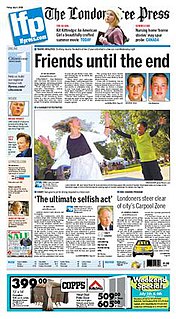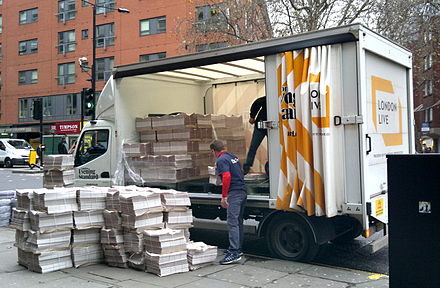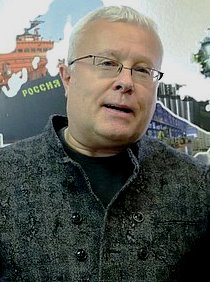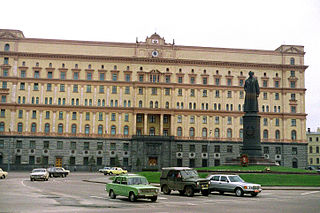
The Times is a British daily national newspaper based in London. It began in 1785 under the title The Daily Universal Register, adopting its current name on 1 January 1788. The Times and its sister paper The Sunday Times are published by Times Newspapers, since 1981 a subsidiary of News UK, itself wholly owned by News Corp. The Times and The Sunday Times do not share editorial staff, were founded independently, and have only had common ownership since 1967.

The London Free Press is a daily newspaper based in London, Ontario, Canada. It has the largest circulation of any newspaper in Southwestern Ontario.

Metro is the United Kingdom's highest-circulation newspaper, published in tabloid format by DMG Media. The free newspaper is distributed from Monday to Friday mornings on trains and buses, and at railway/Underground stations, airports and hospitals across selected urban areas of England, Wales and Scotland. Copies are also handed out to pedestrians.
The Sunday Tribune was an Irish Sunday broadsheet newspaper published by Tribune Newspapers plc. It was edited in its final years by Nóirín Hegarty, who changed both the tone and the physical format of the newspaper from broadsheet to tabloid. Previous editors were Conor Brady, Vincent Browne, Peter Murtagh, Matt Cooper and Paddy Murray. The Sunday Tribune was founded in 1980, closed in 1982, relaunched in 1983 and entered receivership in February 2011 after which it ceased to trade.
The West Australian, widely known as The West is the only locally edited daily newspaper published in Perth, Western Australia, and is owned by Seven West Media (SWM), as is the state's other major newspaper, The Sunday Times. The West is the second-oldest continuously produced newspaper in Australia, having been published since 1833. The West tends to have conservative leanings, and has mostly supported the Liberal–National Party Coalition. The West is Australia's fourth largest newspaper by circulation, and is the only newspaper in the top 20 not owned by either News Limited or Nine Publishing.

George Gideon Oliver Osborne is a British Conservative Party politician, who was Member of Parliament (MP) for Tatton from June 2001 until he stood down on 3 May 2017. He served as Chancellor of the Exchequer under Prime Minister David Cameron from 2010 to 2016. He has been editor of the London Evening Standard since May 2017 and chair of the Northern Powerhouse Partnership (NPP) since September 2016.

The Manchester Evening News is a regional daily newspaper covering Greater Manchester in North West England. Founded in 1868, the paper is published Monday–Saturday; a Sunday edition, the MEN on Sunday, was launched in February 2019. The newspaper is owned by Reach plc ,[2] one of Britain's largest newspaper publishing groups.
DMG Media, formerly Associated Newspapers, is a national newspaper and website publisher in the UK. It is a subsidiary of DMGT. The group was established in 1905 and is currently based at Northcliffe House in Kensington. It takes responsibility for Harmsworth Printing Limited which produces all of its London, Southern England and South Wales editions of the national titles out of print works in Thurrock, Essex, and Didcot, Oxfordshire.
The Leader is a daily newspaper in Wales which is distributed on weekday mornings, combining both local and national news.
Sarah Sands is a British journalist and author. A former editor of the London Evening Standard, she became editor of the Today programme on BBC Radio 4 in 2017.
Veronica Judith Colleton Wadley, CBE is Chair of Arts Council London and board member of Arts Council England (2010–present). She was a senior advisor to the former Mayor of London, Boris Johnson (2012–2016) and Chair of the London Music Fund from 2012–2016, where she remains a Trustee. She is also a non-executive director of the Berkeley Group and an independent Director of Times Newspapers Holdings.
The Derby Telegraph, formerly the Derby Evening Telegraph, is a daily tabloid newspaper distributed in the Derby area of England. Stories produced by the Derby Telegraph team are published online under the Derbyshire Live brand.
London Lite was the trading name of a British free daily newspaper, published by Associated Newspapers, and now defunct. It was available Monday to Friday afternoons and evenings from street distributors in Central London only. On 27 October 2009, Associated Newspapers announced that it had entered into negotiation with staff over the future of the paper. The last edition was published on Friday, 13 November 2009, a date chosen by staff for its swan song.

The London Paper was a free daily newspaper, published by NI Free Newspapers Ltd, a subsidiary of News International. It was available from Monday to Friday each week in Central London from 4 September 2006 until 18 September 2009.

The Daily Telegraph, commonly referred to simply as The Telegraph, is a national British daily broadsheet newspaper published in London by Telegraph Media Group and distributed across the United Kingdom and internationally. It was founded by Arthur B. Sleigh in 1855 as Daily Telegraph & Courier.

The Sun is a tabloid newspaper published in the United Kingdom and Republic of Ireland. As a broadsheet, it was founded in 1964 as a successor to the Daily Herald; it became a tabloid in 1969 after it was purchased by its current owners. It is published by the News Group Newspapers division of News UK, itself a wholly owned subsidiary of Rupert Murdoch's News Corp. Since The Sun on Sunday was launched in February 2012, the paper has been a seven-day operation. The Sun previously had the largest circulation of any daily newspaper in the United Kingdom, but it was overtaken by rival Metro in March 2018.


























